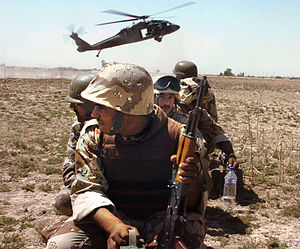At the end of the week that the world marked the tenth anniversary of the invasion of Iraq, it’s worth pausing to remember the quiet heroes of the occupation.
I wish I had got to know Marla Ruzicka. I used to see her in the Al-Hamra Hotel in Baghdad, organising some party or other, charming everyone she met, setting a table of journalists laughing by the pool. She would smile as she passed — she had a smile for everyone, even a bad-tempered correspondent like me, fighting with his editor down the phone.
Marla wasn’t sent to Iraq by a newspaper or an NGO. She came on her own, because she believed the innocent killed and maimed in war deserved compensation. She didnt just interview the orphaned and widowed and homeless and move on, as we journalists did. She didn’t just make speeches or write editorials. She tirelessly documented every case, and pursued them. She founded her own NGO, of which she was practically the only staff member.
It would be easy to dismiss her as a hopeless idealist, the California blonde who took her roller blades to Baghdad. But on her own, she managed to get $20 million of compensation from the US government for Iraqi civilian victims of the war, to go with the $2.5 million she had already won for vicitims in Afghanistan.
I never did take the time to get to know Marla, and it’s much too late now. She kept going to Iraq long after others — including me, I fear — had pulled out because of the danger. In 2005, she and her translator Faiz al-Salaam were killed in a suicide car boming while travelling on the Baghdad airport road.
I never met Margaret Hassan. The first I knew of her, like millions of others around the world, was the haunting video in which she was forced to beg for her life by her kidnappers. But I should have known about her before, I should have known about her work.
If you want an idea of how much Margaret Hassan mattered to the Iraqis whose lives she touched, when she was kidnapped sick children came out of hospital to demonstrate for her release. This was in late 2004, when grown men were afraid to walk the streets of Baghdad, and everyone avoided large gatherings. But they came out in their hundreds, children in wheelchairs, deaf children holding placards.
Margaret Hassan was born in Ireland. She moved to Iraq in 1972 when she fell in love with and married an Iraqi man, Tahseen Ali Hassan. She got a good job in Baghdad at the British Council, but in the 1991 war all that changed. The British Council office closed and she was left jobless.
With her Irish and British passports she could easily have left, but she decided to stay. She joined the humanitarian organistation CARE, and began to work tirelessly for the sick and needy of Iraq, bringing in medicine and resources.
She took the children of Iraq in particular to her heart, and called those who lived through the war and the crippling sanctions that followed Iraq’s “lost generation”. She became the most eloquent of voices against the sanctions, because she lived every day with their consequences.
In the lead up to the 2003 invasion of Iraq, she campaigned relentlessly against the war, travellingto speak to the UN in New York and the House of Commons in London.
Her words to the House of Commons then were prescient. “The Iraqi people are already living through a terrible emergency,” she said. “They do not have the resources to withstand an additional crisis brought about by military action.”
The politicians did not listen, and as Iraq descended into lawlessness and violence under the American occupation, she again decided to stay on, and keep up her work for Iraqi children.
When she was taken hostage, the mujahideen of Fallujah comdemned the kidnapping and called for her release. So did the spiritual leader of Iraq’s Shia, Ayatollah Sistani.
But it was to no avail. Her kidnappers murdered her, and though there have been arrests and trials, they have never been brought properly to justice.
There were others like Marla Ruzicka and Margaret Hassan, who worked tirelessly to help others through the occupation of Iraq. Some of them were Iraqi, some Westerners. Many of their names will never be known.
But at the end of a week when we have been asking how history will judge the architects of that disaster, George Bush and Tony Blair, let us remember that there lived among us some far better. Who looked for their reward not in the applause of nations or the approval of the history books, but in working to alleviate the suffering of others. Who were brave and good, and who walked a true path through the darkness, even to the very end.



Leave a Reply